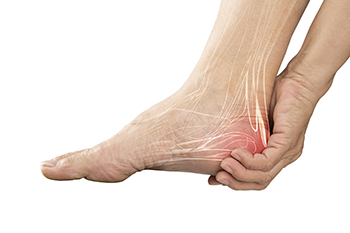
A bruised heel occurs when the protective fat pad beneath the heel bone is damaged from repetitive impact or a sudden injury. This condition is common in athletes who engage in high-impact activities, like running or jumping. It also affects people who wear shoes that lack adequate cushioning. People who are overweight or frequently walk on hard surfaces barefoot are at further risk. Symptoms of heel bruising include pain at the bottom of the heel, which may feel sharp if the bone is also bruised. Sometimes the heel appears red or blue, as the result of bleeding under the skin. Treatment focuses on reducing weight-bearing activities, resting, and protecting the heel with supportive footwear. A podiatrist can recommend customized orthotics, and suggest other modifications to reduce strain on the heel. If left untreated, complications like scar tissue may develop, leading to chronic heel pain. If you have a bruised heel, it is suggested that you schedule an appointment with a podiatrist.
Many people suffer from bouts of heel pain. For more information, contact Tanisha Richmond, DPM of Richmond Foot & Ankle, LLC. Our doctor can provide the care you need to keep you pain-free and on your feet.
Causes of Heel Pain
Heel pain is often associated with plantar fasciitis. The plantar fascia is a band of tissues that extends along the bottom of the foot. A rip or tear in this ligament can cause inflammation of the tissue.
Achilles tendonitis is another cause of heel pain. Inflammation of the Achilles tendon will cause pain from fractures and muscle tearing. Lack of flexibility is also another symptom.
Heel spurs are another cause of pain. When the tissues of the plantar fascia undergo a great deal of stress, it can lead to ligament separation from the heel bone, causing heel spurs.
Why Might Heel Pain Occur?
- Wearing ill-fitting shoes
- Wearing non-supportive shoes
- Weight change
- Excessive running
Treatments
Heel pain should be treated as soon as possible for immediate results. Keeping your feet in a stress-free environment will help. If you suffer from Achilles tendonitis or plantar fasciitis, applying ice will reduce the swelling. Stretching before an exercise like running will help the muscles. Using all these tips will help make heel pain a condition of the past.
If you have any questions please contact our office located in Dayton, OH . We offer the newest diagnostic and treatment technologies for all your foot and ankle needs.